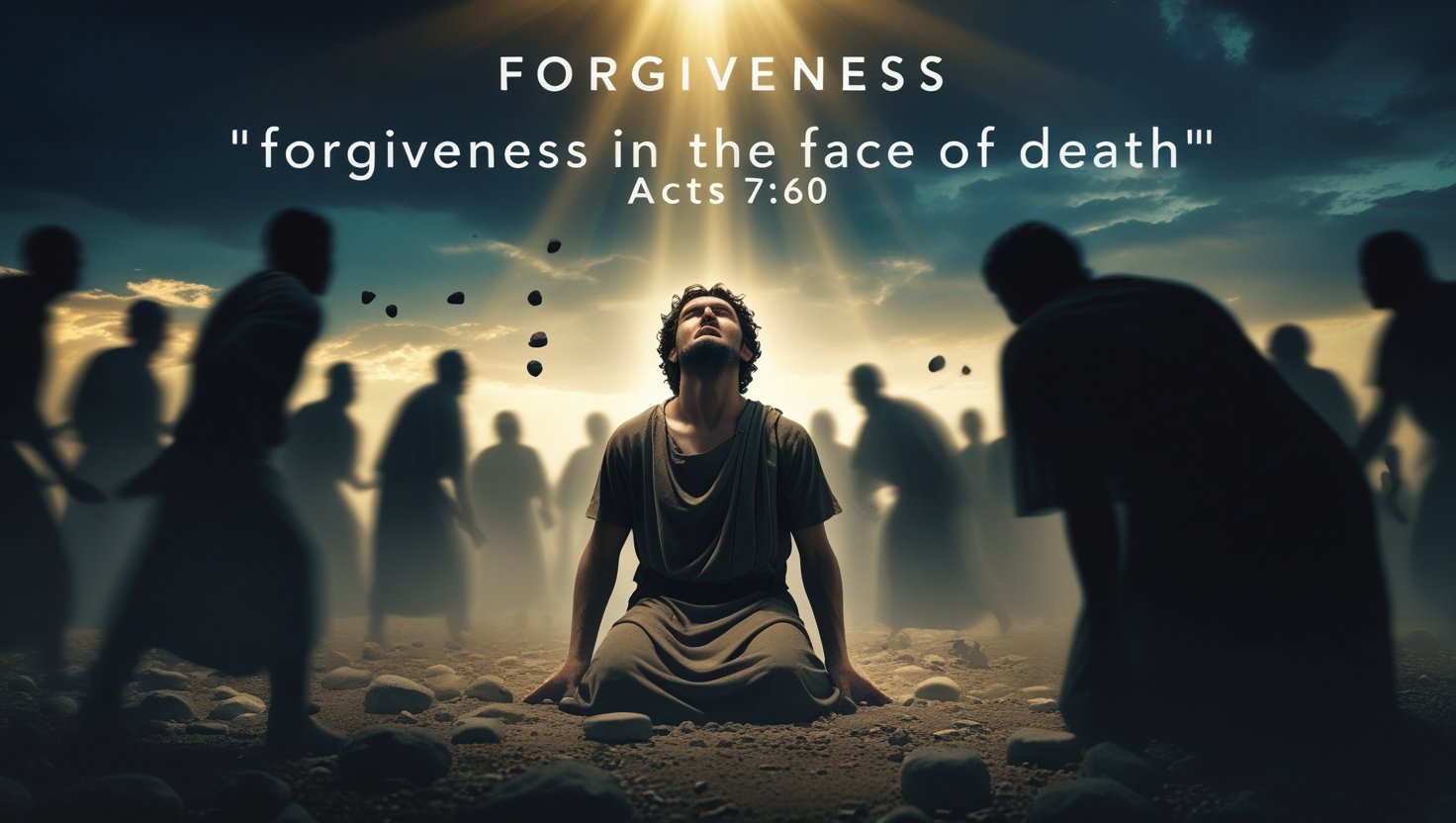Discover the profound lessons of Acts 7:60 about forgiveness and compassion. Dive into Stephen’s story of grace and learn how to transform adversity with empathy.
Acts 7:60: Embracing Forgiveness and Compassion
Introduction
Isn’t it intriguing how sometimes the smallest words in ancient texts can have the deepest impacts on our lives? If you’ve ever had a moment where a single sentence made you stop, think, and reassess your perspective, you’re not alone. This form of introspection can often lead us to grow into more compassionate individuals. Today, let’s dive into an extraordinary instance of profound forgiveness and compassion found in the Bible.
Acts 7:60 is not just any verse; it’s a testament to extraordinary grace. It holds a narrative powerful enough to inspire change. So, whether or not you’re a regular Bible reader, this verse has universal lessons that resonate deeply in our modern world. Ready? Let’s explore it together.
Bible Reference
📖 Key Verse: Acts 7:60
The scene unfolds with Stephen, the first Christian martyr. As he faced a brutal fate, his words were strikingly compassionate: Acts 7:60, “Then he fell on his knees and cried out, ‘Lord, do not hold this sin against them.’ When he had said this, he fell asleep.”
Here, Stephen’s plea for forgiveness towards those who were actively harming him is a vivid demonstration of grace under immense pressure. How does one find such strength and empathy in moments of adversity? Let’s dig a little deeper.
The Context of Acts 7:60
Understanding Stephen’s Story
Understanding why Stephen’s words are so significant requires some background. He was known for being full of faith and the Holy Spirit, performing great wonders among the people. But his straightforward preaching led to controversy. Accused of blasphemy, Stephen found himself before the Sanhedrin, the high Jewish council. Despite the pressure to defend himself, Stephen seized the moment to continue sharing his unwavering faith.
In his speech, he artfully wove through the history of God’s people, pointing out the recurring theme of rejection of God’s messengers. Stephen wasn’t just defending himself; he was imparting a deep theological lesson. Though his words incited anger among his audience, his final act was one of love. He echoed Jesus’ sentiment from the cross, choosing forgiveness over retribution.
Why This Moment Matters
So why does Stephen’s plea hold so much weight? It’s a pure, unguarded expression of forgiveness—a virtue often discussed but only rarely practiced when it counts. It’s a stark reminder that forgiveness isn’t about condoning bad actions; it’s about choosing not to let anger and bitterness consume you. The message is clear: compassion can be transformative, even for those who do us harm.
Importance of Forgiveness
Breaking the Cycle of Anger
You know that feeling when someone wrongs you? The anger that bubbles up is almost instinctual. Holding grudges often feels justified, even empowering. But what’s the long-term cost? Stephen’s example challenges us to break this cycle of animosity.
Forgiveness isn’t forgetting. It’s about releasing the hold that negative emotions have on you. When we forgive, we’re not letting someone off the hook; we’re releasing ourselves. Consider it an act of self-preservation—a way to maintain your emotional peace and well-being. This does not minimize the wrongdoing, but it highlights your decision to not let it define your life.

Compassion: More than Just a Virtue
Cultivating a Compassionate Heart
Stephen’s act of compassion wasn’t impulsive; it was a result of deeply held convictions and years of cultivating a compassionate heart. Compassion stems from a place of understanding and empathy, allowing you to see others as complex individuals rather than one-dimensional perpetrators of wrongs.
We often underestimate the power of small, everyday acts of kindness. A kind word, a simple smile—these gestures can make a world of difference. The ripple effect of compassion can spark change in environments filled with negativity and grudges.
Compassion Beyond Borders
Let’s apply this broadly. Compassion doesn’t stop at individual interactions; it extends to communities, societies, and even strangers across the globe. Consider philanthropy and volunteerism. By giving back, you exercise compassion, seeing your part in a larger human tapestry. Stephen’s plea was a microcosm of this larger reality; it reminds us that compassion transcends personal grievances.
Real-World Applications of Forgiveness and Compassion
Situations Demanding Grace
Let’s face it: life keeps us busy and often tests our patience. From workplace disputes to family disagreements, we’re constantly allowed to practice forgiveness. That coworker who stole your idea? Sure, it’s aggravating. But engaging in a cycle of revenge or cold-shouldering benefits no one.
Similarly, in families—and we all know how complex they can be—practicing forgiveness could be the catalyst for healing deeply rooted issues. In both scenarios, fostering environments of understanding and compassion may seem challenging, but can lead to healthier and happier long-term relationships.
Cultivating a Forgiving Mindset
How do you even begin to cultivate a mindset like Stephen’s? Start small. Begin by forgiving minor grievances. Gradually, you’ll condition your heart and mind to act with grace in more challenging situations. Make it a habitual practice to reflect on your day and identify instances where practicing forgiveness could have made a difference.
Engage in activities that nurture self-awareness, such as meditation or journaling. Over time, these practices can give you the strength needed to forgive larger transgressions and live with a compassionate heart.
Small Acts, Big Impact
We often hear that small acts of kindness go a long way. It’s true. The beauty of compassion is its exponential nature. Smile at a stranger, volunteer at a local shelter, or even simply reach out to someone who needs support. These actions, though seemingly small, have immeasurable impacts.
Consider social movements and global initiatives working towards compassion and reconciliation. What connects people to these causes? It’s the deep-seated belief that sincere acts of kindness can change the world. Imagine if everyone performed one act of compassion daily. The ripple effects would be astounding.
Conclusion
As we’ve wandered through the richness of Acts 7:60, isn’t it fascinating how a few words can encourage deep, introspective thought? Stephen’s choice to forgive highlights a profound truth: it is in the moments of adversity that our true character shines through. If a man facing his imminent demise could forgive those causing him harm, what might we achieve by embracing forgiveness and compassion in our lives?
Reflect on your life: what can you do to practice and promote forgiveness and compassion? Let these thoughts transform you—not as a grand, one-time affair, but as a continuous journey towards enriching your life and the lives around you.

🔍 Explore More Bible Insights:
✅ 1. The Role of Eliab – David’s Brother in His Journey to Facing Goliath
Tone: Relational, reflective, character-focused
🔹 “Family Tensions and God’s Purpose – Discover the Connection”
Read it here.»
✅ 2. What Jeremiah 29:11 Means for Us Today
Tone: Hopeful, encouraging, life application
🔹 “God’s Plans Still Stand – Find Your Hope Here”
Read it here.»
✅ 3. The Wise and Foolish Builders – A Strong Foundation in Faith (Matthew 7:24-27)
Tone: Foundational, practical, discipleship
🔹 “Build Your Life on the Rock – Keep Learning”
Read it here.»
✅ 4. The Roman Centurion at the Cross – A Moment of Revelation
Tone: Awe-inspiring, redemptive, gospel-centered
🔹 “From Witness to Believer – Read His Revelation”
Read it here.»
As a ClickBank Affiliate, I earn from qualifying purchases.
Acknowledgment: All Bible verses referenced in this article were accessed via Bible Gateway (or Bible Hub).
“Want to explore more? Check out our latest post on Why Jesus? and discover the life-changing truth of the Gospel!”








